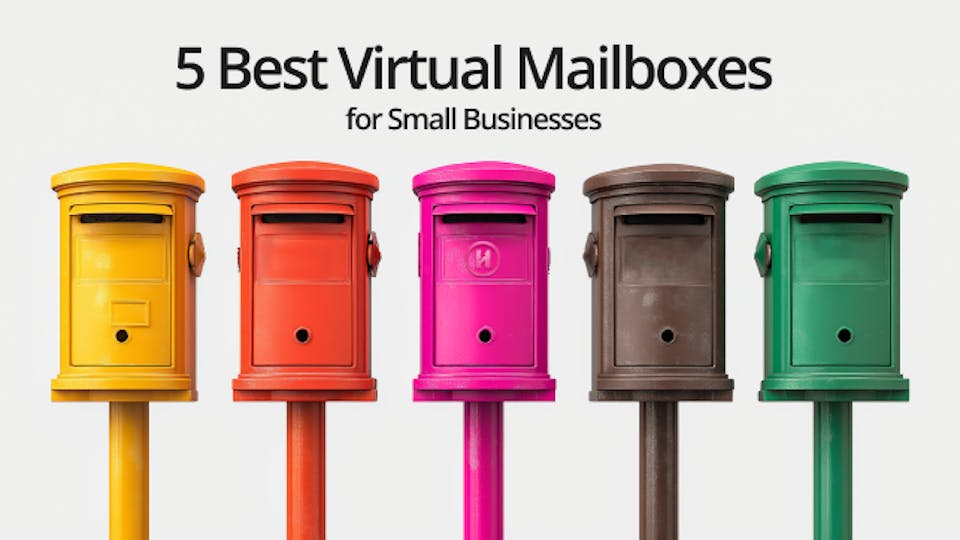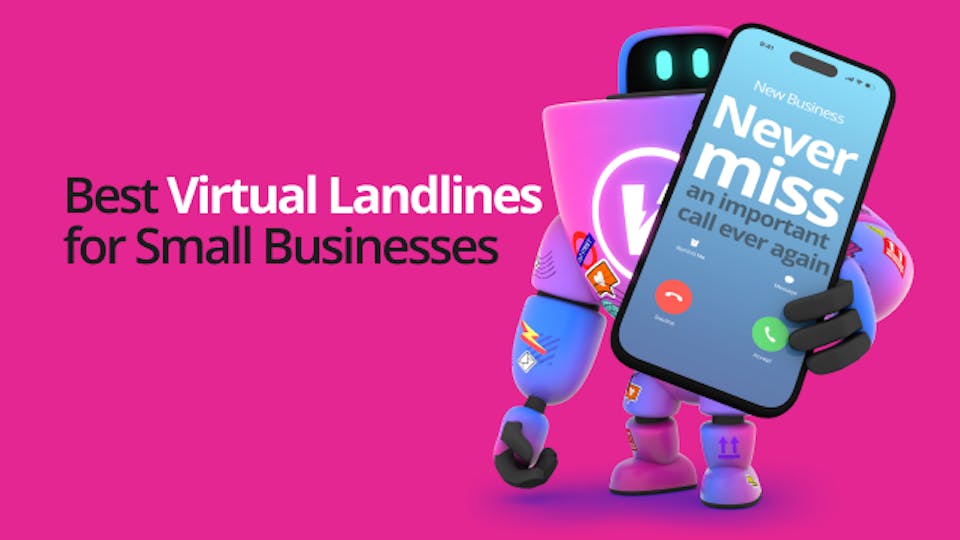26 February, 2025
Business Address for the Self-Employed: What Is It and Do You Really Need It
Table of Contents
If you're self-employed but don't need a physical office to work from, you might think that you don’t need a dedicated business address at all. Although this is true if you're a sole trader, if you want to register your business as a limited company (or similar) it is a legal requirement to provide an address for your business that will carry publicly available information on Companies House. What’s more, a business address offers plenty of additional benefits for self-employed people.
In this article, we are going to break down the subject of registered business addresses in detail to see if it's something you could benefit from.

What is a business address?
A business address is an address to where your business is officially registered, which is usually an office or professional address, which a lot of people think has to be your home address (which it can be, but that carries some risks).
Your business address is where all post related to your business will be sent, and the address you provide to HMRC and Companies House if you decide to register as a Limited Company.
It’s also the address you will advertise to your clients, customers and potential investors, and it will appear on invoices, business cards and your website as well as all formal marketing and sales communications.
If you’re self-employed, do you still need a business address?
Whether or not you will register a business depends on whether you're a sole trader or a limited company.
In short, the answer is that if you are self-employed you don’t have to, but it comes highly recommended. There are many benefits that we will cover below, so whether you are a sole trader, a limited company, or in a partnership for relatively little cost you can register a business address that is different to your home address.
When you set yourself up as a limited company, you are required to register a publicly available company address. This means that your company details and address will be published on the Companies House website. For this reason, you might prefer to use an alternative address from your home address to ensure your own privacy and security.
Sole Traders: The sole trader address requirements that you need to know are that it must be a physical address within the UK, and this can also be your home address. However, note that the address you register with HMRC cannot be a PO Box address.
There are some caveats to this; for Sole traders with a web presence, the Electronic Commerce (EC Directive) Regulations 2002 states that your correspondence address must be disclosed to your customers. Your business contact address doesn’t have to be the same as the address you used during sole trader registration. However, it’s more convenient to use the same address across different business operations. To avoid revealing your home address to everyone online, you can easily set up a virtual office address in London.
Other self-employed situations: A virtual business address for self-employed people works the same way for other business types too. For example, if you’re in a partnership. In this arrangement, you need an address to register with the relevant government departments and to make tax payments individually or on behalf of the partnership.
All-in-all and for all scenarios, creating a virtual address that isn’t linked to your personal address is important for the following reasons:
- Protect your private residence from public channels;
- Save money by getting a premium address without paying premium physical office prices;
- Operate your business outside of the UK while still being registered with Companies House and HMRC;
- Get access to mail and document management services;
- Create a positive perception of your company for the public.
How to change a self-employed business address if you are already registered
If your business is already registered with Companies House, you can download an AD01 form from the government website and send it by post or use the online service to change your company’s registered office address. Keep in mind that if your address changes, Companies House must be informed within 14 days. If you’re a sole trader, you should change your address within your personal tax account on the HMRC website.
We’ve already posted detailed instructions on how to change a registered office address, so check out the full article.
Can you use your home address?
Yes, both sole traders and limited companies can register and receive official business mail using their home address. However, as mentioned above, if you’ve established a company your information will be made public and your customers will easily be able to find this address on Companies House, which will jeopardise you and your family’s privacy.
For this reason, if you intend to become a limited company, operate as a sole trader or are in a Partnership, you should think twice about using your home address for business and opt for a separate address instead.
Different ways to obtain a business address for the self-employed
If you’re self-employed and want to secure a dedicated address for your business, there are three options.
1. Virtual office services
For many start-ups and small business owners, virtual office services represent an easy and cost-effective alternative to a physical home address (you can find more details about what a virtual office is in another of our articles).
A virtual office allows your business to fulfil all of its legal obligations while still operating remotely, providing a legitimate physical address that meets all legal requirements without having to pay for the overheads of renting or owning one.
A virtual registered business address in the UK is the best practical solution for obtaining administrative services remotely. For those who put emphasis on cost-effectiveness, it is also the most affordable one. There are many providers to choose from, in the UK, including The Hoxton Mix. The services and packages they offer typically include a prestigious business address in a prime location, mail handling services, virtual call forwarding, and access to meeting rooms or office spaces on-demand.
Advantages:
- Professional, secure and prime address. This allows you to work from your own home, on the road or abroad, while still presenting a professional and suitable business address to customers, clients and suppliers. With a virtual office, you are able to travel to different cities or countries without the need to be physically present. This flexibility and global reach can help expand the business's geographical footprint and target new markets.
- Protecting your privacy. Your privacy is protected because your virtual office address can be published to Companies House instead of your home address, while it can also be included on invoices, your website and other important business correspondence.
- Reduced Overheads. Virtual office services significantly reduce overhead costs. Traditional workspaces require rental and lease costs, office furniture, utilities, and maintenance costs. The option of virtual offices is particularly advantageous for small businesses operating on a tight budget. If you are looking to start one, contact The Hoxton Mix to help you with business registration.
2. Commercial office space rental
Renting commercial office space might be what first comes to mind when you think about how to secure a dedicated business address. Historically, having a physical office space was the norm for most companies. The complexities of opening a physical space, not to mention the costs, can be prohibitive.
How easy it is to find commercial office space will depend on where you live. If you're based in a big town or city you'll have many more options than if you were in a village or rural area.
These spaces can be leased on a short or long-term basis, with costs depending on factors including location, size, amenities and length of contract, but note this is the most expensive option for self-employed people and business owners.
Advantages:
- Bespoke to your business needs. Renting a commercial office space grants you the freedom to customise the workspace according to your specific business requirements and branding needs (although the extent to which you can make changes will depend on the lease agreement), while it also makes it easier to grow the business as you make new hires or require new stock.
- Separating home from work. A commercial office space ensures a higher level of privacy and separation compared to using your home address. This is particularly beneficial when dealing with sensitive client information or holding confidential discussions with partners, providing an environment of focused and undisturbed work.
- Expansion and growth. This is a double edged sword, so make sure your office requirements take your growth into account. Changes and lease breaks can end up being costly as well as time consuming. Setting up a physical business base gives you the ability to meet your exact business needs and give your business and employees a permanent brand home.
3. Coworking spaces
These are experiencing a significant surge in popularity, especially among self-employed professionals, freelancers, and startups. These shared work environments offer a mix of private offices, dedicated desks, and communal areas where individuals from diverse businesses can work together.
Advantages:
- Community. You’ll get to be part of a vibrant community of like-minded business owners and self-employed people. It creates a safe place for exchanging ideas among professionals from diverse backgrounds, while you can share valuable insights, boost innovation, encourage skill development, and even form potential business partnerships.
- Flexibility. Coworking spaces often provide flexible membership plans, allowing self-employed individuals to choose the level of access they need or even use varying locations. For instance, they might require a hot desk for occasional use or a dedicated workspace they can rely on every day. This flexibility is key to co-working, but plans and costs can rise quickly if you rely on them permanently and as your business grows and you need to add more people.
- Note, that not all co-working spaces will offer mail handling services so ensure you are clear about how your official post and correspondence are handled.
Set up a business address in minutes with the Hoxton Mix.
If you're wondering how to set up a business address for your own self-employed venture in the UK you're in luck, because here at the Hoxton Mix we've helped hundreds of small businesses and start-ups just like yours obtain a prestigious London-based virtual office address, right in the heart of Shoreditch.
For more information and to set up your self-employed business address in minutes, check out what a virtual office address with The Hoxton Mix can do for you.
FAQ
What are the benefits of a UK virtual address for my business?
A UK virtual address offers privacy, a professional image and freedom to work from anywhere. It helps separate personal and professional life while projecting credibility to clients. It is also the easiest way - in terms of time, cost and commitment - to set up an alternative address.
What is a virtual address in the UK, and why do you need one?
A UK virtual address is a service that provides a prestigious business address without the need for physical office space. A virtual address can enhance your brand's reputation, safeguard privacy and manage business mail efficiently.
How to set up and register a UK virtual address?
Setting up a UK virtual address is easy. Choose a reliable provider, select your preferred address and service package, and register online. We offer step-by-step guidance and support to help you get started. Click here to set up your virtual address hassle-free.
Do you need a business address if you are self-employed?
Yes. When you register as self-employed, you need to provide your business details, including an address. Technically, you can use any address you like as your self-employed address, provided it is a physical address located in the same country as you operate, and you can access the mail from there. But some options offer additional benefits for limited companies and sole traders, specifically, virtual business addresses
How to change a self-employed business address?
If your business address is registered with Companies House, you can inform them about the change online (via the government portal) or by post. Make sure to let them know of the change within 14 days.
Is it legal to use a virtual address for the self-employed?
Yes. A virtual business address for self-employed people is not only legal but can also be the best option. The only two legal requirements for business addresses are that they must be physical locations and be located in the country where you operate. So, as long as your virtual address meets both stipulations, you can register it as your business address.
Hand-picked related articles

London
Virtual Office
Mail Management
![Starting a Business While Employed in the UK [All Considerations]](https://images.prismic.io/hoxton-mix/ODg5YzBjODUtNTY3My00NDIxLWI1YWMtNTRlNWVlZTE5NTJm_eb77e98b-ff83-430a-aba0-3633c7944c11_running-your-own-business-while-still-employed.jpg?auto=compress%25format&rect=120%250%25720%25480&w=960&h=640)




